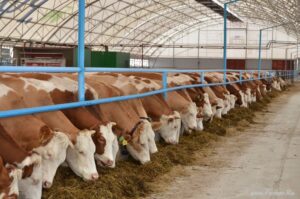
Four enterprises in Volyn, Rivne, Cherkasy, and Khmelnytskyi regions received UAH 116.3 million in partial state compensation for the construction and reconstruction of six livestock farms, according to the Ministry of Economy, Environment, and Agriculture.
“The state reimbursed up to 25% of the cost of farms, milking parlors, and production facilities for processing by-products that were put into operation,” the ministry said, clarifying the decision of the Ministry of Economy’s commission on state support for the development of livestock farming and agricultural product processing.
It is expected that agricultural producers will be able to keep about 3,000 head of livestock on new and reconstructed farms.
“Supporting livestock farming is an investment in Ukraine’s food security. Enterprises that modernize production and build new facilities in wartime receive real financial assistance from the state. This year, we have reimbursed up to 25% of the cost of facilities that have been put into operation since the beginning of the year,” said Deputy Minister of Economy, Environment, and Agriculture Taras Vysotsky, whose words are quoted in the report.
The Ministry of Economy reminded that support is provided in accordance with the procedure for the use of funds allocated in the state budget for the development of livestock farming and agricultural product processing, approved by Cabinet of Ministers Resolution No. 950 of August 6, 2025. Compensation is provided for completed projects submitted through the State Agrarian Register.
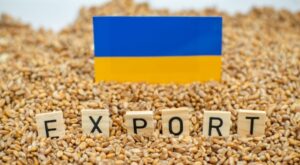
Ukraine exports more than $400m worth of products to Lebanon, although the potential is $1bn, the supplies of cattle, meat and dairy products are promising, Minister of Agrarian Policy and Food Vitaliy Koval said after a visit to Lebanon and a meeting with businessmen.
The Ministry of Agrarian Policy and Food noted that Koval met with Lebanese businessmen – representatives of more than 12 companies involved in imports: flour millers, traders, entrepreneurs who buy food products, meat and cereals from Ukraine.
According to the Minister, Lebanese businessmen import tens of thousands of tons of cattle. They have recently started importing sheep to Lebanon. It is these areas of cattle breeding because of the shortage of meat can be promising for Ukrainian agrarians.
“Today we export more than $400 million worth of products to Lebanon, although the potential is $1 billion. That is why the task of the Ministry of Agrarian Policy is to increase imports of our products to Lebanon. I discussed with their businesses what should be done to increase trade turnover. Lebanese businessmen noted some bureaucratic moments and logistical problems. Now I clearly understand what needs to be simplified in procedures. Lebanon is an important trade partner for us, so we will work on developing our relations further,” Koval emphasized.
The Minister drew attention to the fact that the Ukrainian community is very active in Lebanon. During the meeting with its representatives, the Ukrainian delegation discussed the logistic communication with Ukraine and the increase of domestic products in Lebanese stores.
Koval urged the diaspora to be ambassadors of Ukraine: to popularize Ukrainian products and emphasize their quality.
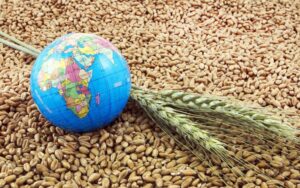
Ukraine currently has access to export products in 340 trade areas of agricultural products, and plans to open 240 more markets in the next five years, said Serhiy Tkachuk, head of the State Service for Food Safety and Consumer Protection.
“We are one of the key state agencies responsible for opening new markets: we work with more than 60 countries on plant and animal products. We intend to open 240 new markets within five years. At the same time, the process of our country’s integration into the EU continues. And if we look at Chapter 12 on food security, veterinary and phytosanitary policy, it alone accounts for 19% of the requirements that Ukraine faces in general. So, there is a lot of work to be done, but we will manage, because we are responsible to our defenders and future generations,” the Ministry’s press service quoted him as saying at the Kyiv International Forum.
Tkachuk also reminded that the service is one of the key players in opening new international markets for Ukrainian business, as it is responsible for controlling 100% of Ukrainian agricultural exports.
“Implementation of EU requirements is now a priority for Ukraine. But at the same time, it is important for us to defend our own interests – the interests of Ukrainian business, first and foremost. In particular, our tasks now include maintaining stable trade with partner countries, removing barriers to exports, lifting restrictions on exports of certain products, and simplifying certification and transit procedures,” he added.
The Head of the State Service of Ukraine on Food Safety and Consumer Protection also spoke about the digitalization of all processes and services of the agency. “According to him, the digitalization will reduce the time for obtaining permits from 5-20 days to 1-5 days. In addition, certain services, such as capacity registration, will be provided in real time, i.e. within a few minutes.
“It will be possible to apply for services online, without unnecessary trips, queues and stop documents, as well as to see the status of the service in your own online user account; see all inspections and their results; and pay for services easily through a single system with automatic generation of payment documents,” Tkachuk said.
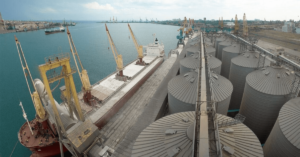
“As of March 2024, Kernel, one of the largest Ukrainian agro-industrial groups, has returned to pre-war volumes of agricultural exports by sea, said Yuriy Kizlevych, Head of the Transshipment and Fleet Department of the agricultural holding, during the online conference of the Center for Economic Strategies “Challenges at Sea and Border. What is the future of Ukraine’s foreign trade?”.
“We are investing in infrastructure. As of today, we have really returned to pre-war export volumes. During the full-scale invasion, we continued to invest in port terminals. We now own a certain cluster of terminals, both for grain and vegetable oil transshipment,” he said.
According to Mr. Kizlevych, Kernel handles not only its own agricultural products but also provides this service to other operators, which has a positive impact on the domestic market and exports.
The head of Kernel’s transshipment and fleet department noted that the agricultural holding sees prospects for increasing exports via the Black Sea sea corridor.
He also said that 70% of Kernel’s exports are to non-European destinations, including Asia, the Middle East, North Africa, and only then to Western Europe.
Speaking about the cost of logistics, Kizlevych stated that since the beginning of the war, it has had to be divided into two components: domestic and maritime. All domestic market operators have problems with the former, in particular with regard to facilities where infrastructure has been damaged.
“However, thanks to the fruitful cooperation between business and the state, we see that the best ways to solve problematic infrastructure issues are being found. Inland logistics is changing very dynamically, taking into account the existing export channels. We see that this process has become more planned and manageable, comparable to the pre-war level,” he said.
Describing Ukraine’s maritime logistics, Kizlevych confirmed the impact of the military bonus factor on the total cost of export transportation.
“Of course, there is a factor of the military premium that must be paid to shipowners for the call of ships (to the Ukrainian part of the Black Sea – IF-U). Fleet freight has become more expensive. If we look at the “grain corridor”, its first Ukrainian version, we can state huge losses in port dues for the downtime of the large-capacity fleet. These are millions, tens of millions of losses,” said the Head of Transshipment and Fleet Department of Kernel.
At the same time, he emphasized that market participants see positive dynamics in the reduction of insurance rates, which is a positive signal and gives hope for a more stable functioning of Ukraine’s sea routes in 2024.
Before the war, Kernel Agro Holding was the world’s largest producer of sunflower oil (approximately 7% of global production) and a major exporter (approximately 12%). It is one of the largest producers and sellers of bottled oil in Ukraine. In addition, it is engaged in the cultivation and sale of agricultural products.
Kernel’s net profit for FY2023 amounted to $299 million, while the company ended the previous year with a net loss of $41 million. The agricultural holding’s revenue for FY2023 decreased by 35% to $3.455 billion, but EBITDA increased 2.5 times to $544 million.

In a conversation with the Secretary of State of the Presidential Chancellery, Andriy Yermak expressed hope that Ukraine’s neighbors would abandon the blockade of Ukrainian agricultural exports after September 15.
“The interlocutors discussed in detail the issue of ensuring the export of Ukrainian grain by land to the EU countries in the context of the continued blockade of Ukrainian ports. The head of the Presidential Office expressed hope that Ukraine’s neighboring countries would refrain from imposing unilateral restrictive measures on the export of Ukrainian agricultural products after September 15,” the press service of the Presidential Office said in a statement on Sunday following the meeting in Jeddah.
“During a meeting with the State Secretary of the Office of the President of the Republic of Poland, Head of the Bureau of International Policy Marcin Przydach, the head of the office expressed gratitude to Polish partners for their comprehensive assistance and solidarity with Ukraine in countering the armed aggression of the Russian Federation,” the statement also said.
The press service also reports that “Yermak praised Poland’s readiness to join the implementation of the Ukrainian peace formula.”
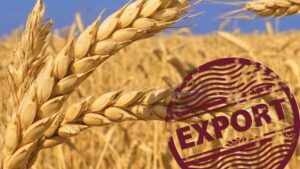
The leaders of Romania, Bulgaria and Croatia have supported the “Grain from Ukraine” initiative announced by the president of Ukraine and announced further efforts to increase existing and create new transit corridors for the export of Ukrainian grain and other agricultural products.
“Since the beginning of the war, 8.4 million tons of grains and oilseeds from Ukraine have been transited (through Romania) to consumers in the world. We expect transit exports from Ukraine to increase in the coming months,” Romanian Prime Minister Nicolae Ciuca said in a video message at the international food security summit in Kiev on Saturday.
He noted that Romania has acted very strongly in support of Ukrainian grain exports through Romanian ports and will continue working to increase connectivity between the countries by land and rail, including the recent opening of a new border crossing.
Ciuche also stressed that Romania has and will not back down from supporting Ukraine and Moldova in the energy sphere. “We will not allow Russia to plunge the region into darkness,” he said.
Bulgarian President Rumen Radev said at the summit that Bulgaria has managed to transport about 200,000 tons of grain from Ukraine across the Danube in recent months, and the country intends to continue this transportation project.
“Unfortunately, the loss of power in Ukrainian ports due to Russian shelling has made this process difficult for Bulgarian vessels,” he said.
Radev also said Bulgaria is providing fuel to Ukraine so the country can support the agricultural and transportation sectors.
Croatian Prime Minister Andrea Plenkovic also supported work on new corridors for the supply of Ukrainian products as part of the EU’s Solidarity Routes project.
“Croatia is actively joining, and will attract other ports on the Adriatic and there are opportunities for corridors along the Danube River,” said the Croatian government head.
The three leaders welcomed the extension of the Black Sea Grain Initiative for another 120 days, and the Bulgarian president urged the search for stable long-term solutions.